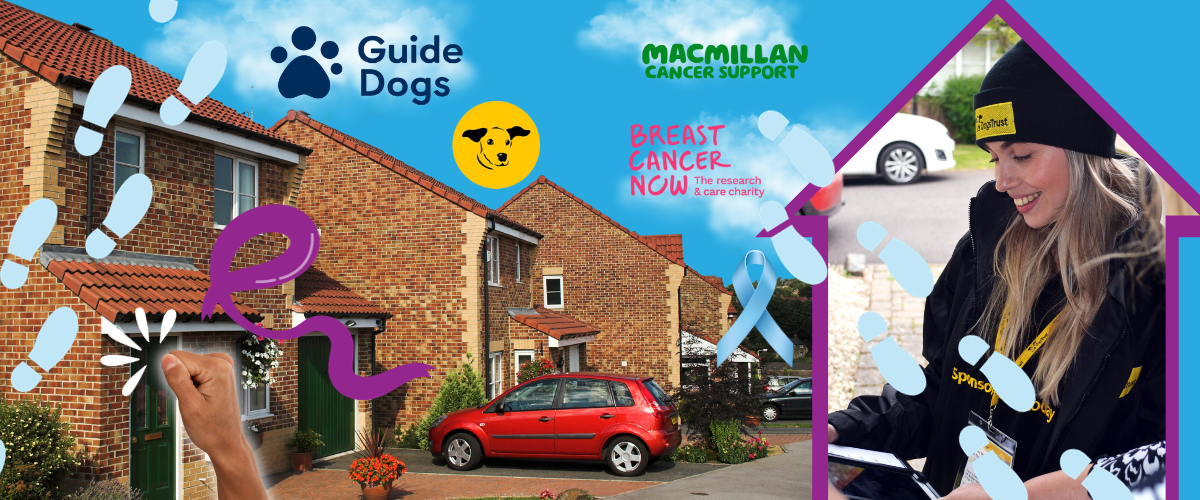11 essential tips for door to door fundraisers (from first knock to fond farewell)
Any self respecting and well-trained door to door fundraiser knows what it takes to meet the stringent compliance required to do the job. Protecting charities reputations from misrepresentation and the public from unwanted behaviour is priority. A part of this is the journey up to the front door, but how many door knocking fundraisers have really thought about the best practice here? Enjoy these fundraiser tips on how best to approach a potential donors front door for the desired results
Keeping up appearances
Before you even leave your own front door behind, make sure you’re presentable. That means the correct clean uniform, visible ID and tidy hair. Also make sure you’re free of body odour! You don’t want to give any potential donor any reason to think negative thoughts
Consider what time of day it is
As a door to door fundraiser you’ll already have worked out when most people will be at home and so what the best times to visit is.
Knocking too early in the morning or too late at night is not socially acceptable so you’re already restricted in that way.
Diving deeper, you’ll learn that the majority of the working generation will be home after 5pm and most receptive to a conversation between then and 7pm.
Generally speaking, the retired and stay at home parents will usually be in and out all day.
Of course, there will always be exceptions to the rule and some will work antisocial hours and may well need to sleep during the day (such as NHS workers or shift workers). Check for signs of this, such as closed bedroom curtains and complete silence from inside the house.
Approaching the home respectfully
As you approach anyone’s home it’s important to be respectful and treat their property as you’d like yours to be.
Close any gates quietly and properly behind you, avoid knocking into any flowers or plant pots and be mindful of any cats in the garden.
In particular, look out for any signs around the outside of the home that indicate the dweller doesn’t want to be disturbed.
The best kind of knock
The actual knock or ring on the door is also something to consider. Nobody wants to be made to jump when they have a visitor so focus on a soft and friendly ‘rap rap rap’ rather than being too heavy handed and banging.
Leave a least 20 seconds between trying again and never knock more than three times.
Be mindful of personal space
Once you’ve knocked, step back a little – more if there’s a bigger porch. Appreciate that when someone opens the door they won’t want a stranger in their face especially if they’re vulnerable.
It’s important that you never make anyone feel threatened or intimidated in any way.
Beware of the dog!
Most of the time you’ll hear a dog before you see it, in which case prepare yourself for being barked at or rushed at!
The vast majority of dogs are friendly but will all seek to guard their domain so remain calm and upright.
If the dog is clearly friendly, always ask permission before you touch. Never assume you’re welcome to do so.
First impressions
There’s a few things you can do to make a good first impression and positive facial expression, eye contact and body language is key.
As seasoned Charity Link Door to Door fundraiser Darren says
The moment they open the door I turn my head towards them and give eye contact with a smile for a split second longer than normal
Always smile – always! This is the single best way you can make an instantly good impression on a complete stranger.
You’ll come across as non-threatening, friendly and open as well as releasing happy hormones such as endorphins and oxytocin that you’ll both need to feel good about the exchange.
Another great tip from Darren is to remove any hat or cap - he says
This creates a subconscious feeling of respect and likeability. I really believe this makes a difference and is an underrated gesture
With your body language, make sure you have an open and relaxed stance that shows you like your potential donor and you trust them. That’s a great starting point too.
Apologise!
Offer up an immediate apology for disturbing them and reassure them that you won’t take long. This is a great way to disarm any irritation and acknowledges that you respect them and their time.
Building relationships
Speed building relationships is a core skill of any face to face sales person and fundraising is no different!
Check out our 12 easy ways to speed build positive relationships
Ask lots of questions and really listen to the responses rather than just waiting for your turn to talk. Share the fundamental problems your charity is dealing with in a sentence or two and use story telling of individual recipients impacted by the cause and giving solutions your organisation is providing.
Especially important is expressing clearly how any donated money will help, which empowers the donor to know they can make a difference.
Be prepared for objections and know how to respond
As in our blog ‘objection handling tips for charity fundraisers’ donor objections are simply a part of the job! Knowing when to admit defeat and when to offer up a contrary thought is a big part of what makes a charity fundraiser a good one.
With objection handling, the key thing is to use your listening skills and your knowledge. By hearing them out, you can identify their problem – the why behind their no.. Once you know that, you’ll know the solution.
Learn the 10 main reasons why people don’t donate to charity
Never ever argue in response to an objection. Instead seek to agree on some level first so as to validate their concern. Next, pose a question that makes their initial concern seem manageable.
Closing down with fond farewells
Your departure from someone’s door is as important as your hello.
Once you’ve made your pitch and gotten your result (whatever that may be), ensure you leave in the post positive way possible.
Thank them for their time and wish them a pleasant day.
Door to door fundraising jobs are a tough nut to crack, but for those that master the skills, it’s an incredibly rewarding role.
Not only are you making a difference to charities through your work, you’re enjoying the mental challenge that boosts confidence and teaches transferrable skills too.
Our door to door fundraisers are employed by Charity Link on permanent contracts, fulltime or part-time.
Door to door fundraising takes place in pre-allocated areas by postcode, visiting specific streets and houses.
This role works well for people who prefer to work outside and enjoy a quieter pace. You’ll cover about 1 mile an hour and will be on your feet for your whole shift so we recommend comfortable shoes!
Charity-branded uniform is provided as well as an electric tablet to sign up donors. Core hours are 11am-7pm. Its particularly important that you can work the twilight hours (5-7pm) when most people are at home.
You will be the public face of one of our charities, interacting with the public and seeking their support by way of regular monthly direct debit donations or lottery sign-ups. This role really does make a difference to people’s lives!
Charity Link are hiring new door to door fundraisings to join our growing team right now! If you think you’ve got what it takes, why not hop over to our jobs page and apply for a role in your location?




